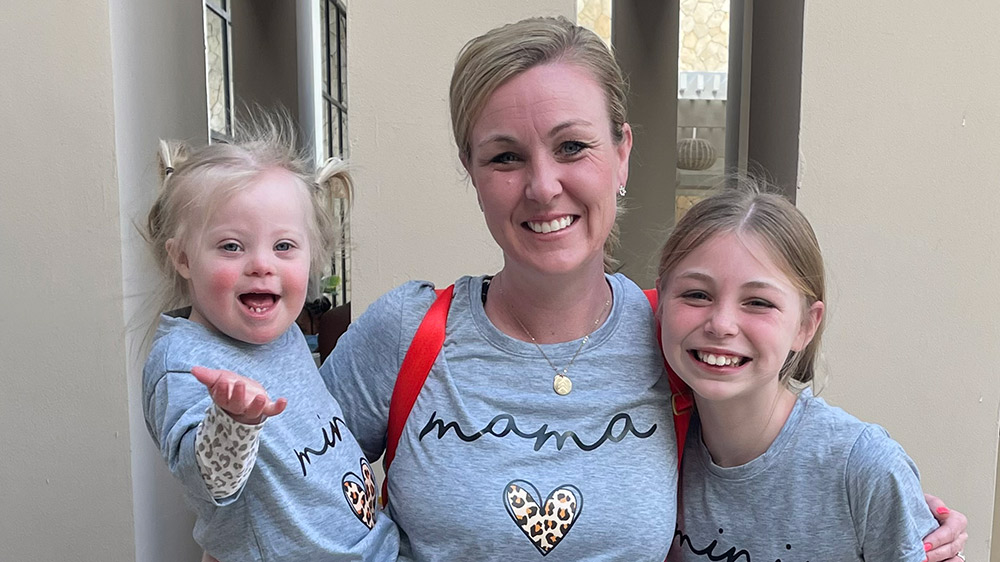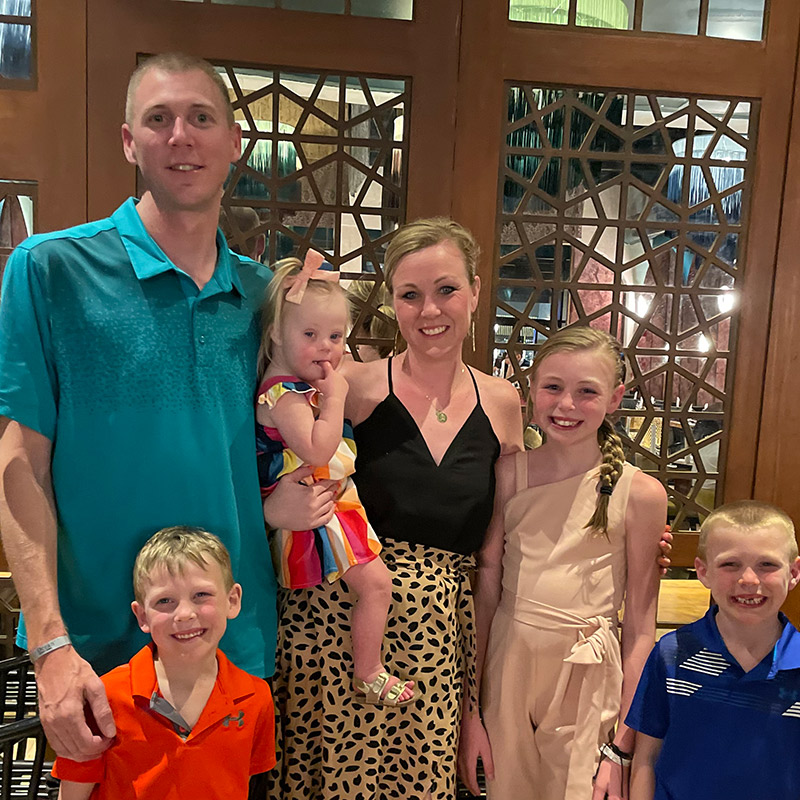
My goals for advocating and shouting the worth of my daughter and all children/individuals with differing or special needs.
By Nicole Stoecken, DO
My name is Nicole Stoecken. I have been a pediatrician in the MercyOne Central Iowa area for the past nearly seven years and worked in our Grimes clinic location for three years. I reside in the Grimes community with my husband Andy and our four children, Emma, Blake, Brooks and Josie.
Our world was initially turned upside down in December 2019, when our fourth child was born and surprised us with an extra chromosome. Josie had a birth diagnosis of Trisomy 21, commonly known as Down syndrome, and a major congenital heart defect. There was initial grief and sorrow as our family processed these unexpected diagnoses, and those early days were some of the hardest we have ever had to endure.
With each passing day we fell more and more in love with the little girl in front of us and we began to see and experience the pure joy that little extra chromosome brought with it. I am blessed to say that Josie is now a healthy, happy, and thriving 2-year-old, causing all the mischief a typical 2-year-old does.
One of the hardest parts of walking this journey and becoming embedded in the special needs community is hearing about the frustrations families face with their child’s medical care and for advocating for their child’s individual needs. As a pediatrician and a mother, it is absolutely heartbreaking for me to read or hear a mother say a doctor said their child will never do X, Y or Z. There is no single individual that can predict any child’s future with 100% certainty.
We can recognize, based on an individual’s strengths and weaknesses, there may be challenges and struggles to reach a goal; however, if we equip that individual with the appropriate resources and tools we may work to achieve a goal or at least a modified version of that goal. With increasing availability of therapies, early interventions and technology, my job as a pediatrician is to connect my patients and families with these resources as they see fit to support their child’s ongoing development.
I have been especially fortunate in that I have been able to take many of the tools I have learned to support my own child’s development back to my daily practice to support the development of each of my patients. One of the greatest gifts I have been given is that of empathy - I can truly say to families that are walking this journey or who have been given a new or unexpected diagnosis, “I have been there. I understand all the emotions and feelings you are experiencing at this time. I understand the challenges that lie in front of you and I will support you on this journey with your child.”

I feel so blessed to be raising a child with a disability in today’s society. There have been some amazing parents who have walked this journey before us that have advocated to reshape how the world sees and perceives individuals with differing needs. That being said, there is still tons of work that needs to be done to recognize the value and worth of every human regardless of their race, ethnicity, physical or intellectual disability.
There are important things each of us can recognize and strive to improve.
Encourage person first language. Recognize the individual first and not the diagnosis or disability. For example, Josie is a little girl with Down syndrome. She is not a Down syndrome girl. Down syndrome is part of who Josie is, it’s not who or what she is. Every individual with Down syndrome is a unique individual.
Encourage inclusion. This starts from an early age. Expose children to inclusive books. Encourage play with all individuals and friends. Recognize that it is okay for children to be inquisitive and ask questions. As parents, we love to talk and educate or share about our child’s unique strengths and weaknesses. Teach your child to recognize the similarities as we are each more alike than different. If there is a difference, for example a child in a wheelchair, you can explain to your child while you use your feet to move, that child gets to use wheels to move, how cool that is! Recognize inclusion at school benefits all students, not just those with disabilities. Advocate for inclusion in your community with adaptive playground equipment, adaptive community spaces and restrooms.
Recognize ableism and prejudices or stereotypes we each may carry. Work to recognize some of these stereotypes and educate yourself on how to reshape these views. Individuals with disabilities and special needs are often thought of as “less than.” A person is a person no matter how small to quote Dr. Seuss. Recognize that our value and worth as a human is defined by something greater.
A very wise friend of mine raising a super sweet son with Down syndrome summarized our life of special needs parenting best by saying, “It’s just more.” It’s more appointments, more therapies, more worry, and more fears; but it’s also more joy, more celebrating, more love, more milestones, more networking, and more community.
I feel so blessed to be part of the “lucky few” and look forward to continuing to advocate for all children in the future both as a mom and as a pediatrician.
